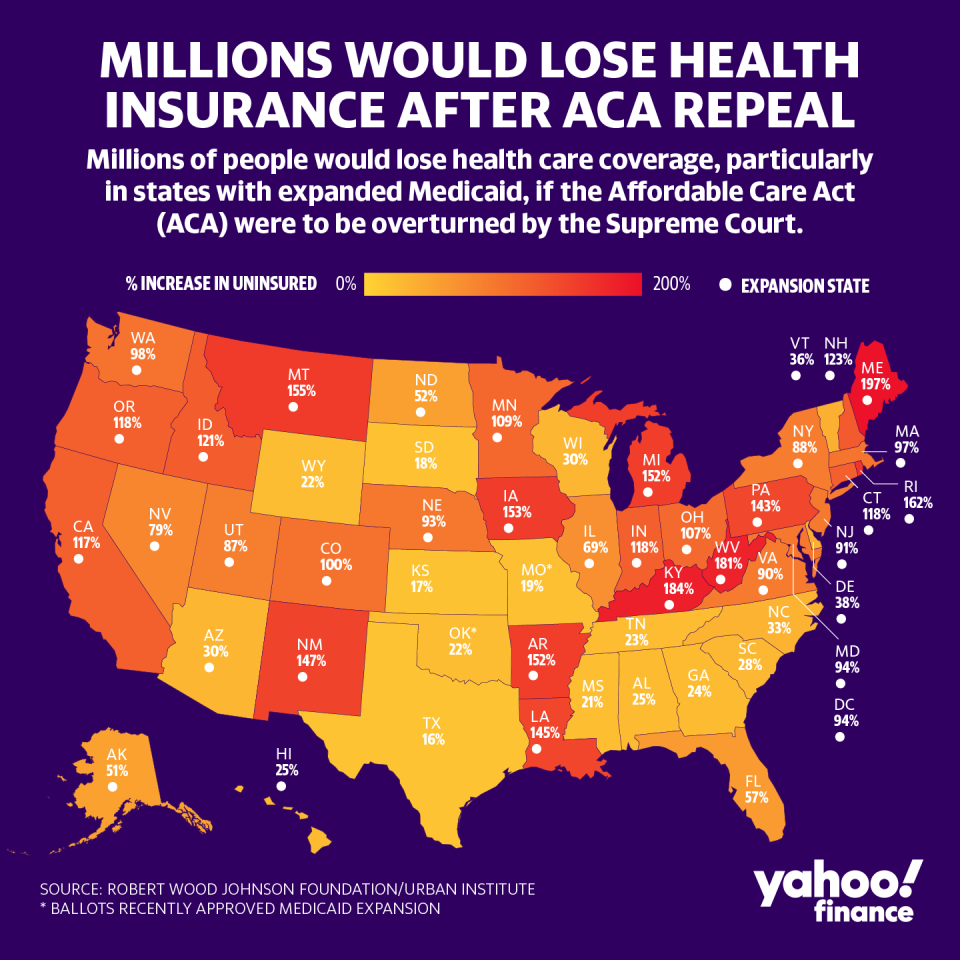Obamacare enrollment going strong as Supreme Court weighs constitutionality case
Although the future of the Affordable Care Act (ACA) remains uncertain, pending a case before the Supreme Court, that hasn’t deterred Americans from signing up for its health care coverage during open enrollment.
Open enrollment, which began on Nov. 1, saw 818,365 people sign up for plans through the health care marketplace. And 173,344 of them were new enrollees.
This comes at a time when over 22 million Americans lost their jobs amid the coronavirus pandemic, with 10 million people estimated to have lost employer-sponsored health coverage by December 2020.
“The numbers show that many Americans rely on ACA insurance programs for their health insurance coverage,” Christine Eibner, a senior economist at the RAND Corporation, told Yahoo Finance. “A Supreme Court ruling that negates the law could leave many people at risk of becoming uninsured — a frightening prospect at any time, but particularly during a global pandemic.

‘A layoff away from being uninsured’
The Supreme Court began hearing arguments last week regarding the legality of the ACA’s individual mandate, which requires people to have health insurance or else face a tax penalty.
Those pushing for a repeal of the individual mandate are arguing that if the mandate were to be invalidated, then the entire landmark health care bill should be as well.
However, during the arguments, Chief Justice John Roberts, considered a crucial swing vote, and Justice Brett Kavanaugh, a member of the conservative bloc of the Court, both indicated that they were skeptical of overturning an entire law just because of one aspect deemed unconstitutional.

“Beyond that, there’s an understanding even though it wasn’t necessarily stated of how chaotic our health care system would be if the entire Affordable Care Act is dismantled, because it has over the last 10 years become so much an integral part of our health care system, and dismantling it, declaring it totally unconstitutional would result in more than 20 million people losing their coverage,” Wendell Potter, a former executive for Cigna and current president of the Center for Health and Democracy, told Yahoo Finance.
At least 21 million people would lose health care coverage with the repeal of the ACA, commonly known as Obamacare.
Potter argued that this is a product of the design of the U.S. health care system, which effectively ties health coverage and employment closer together than in other countries.
“People are hurting,” he said. “People have lost their jobs and in many cases, also lost their health insurance. We’ve seen numbers in the millions of people who’ve lost their jobs but also who were pushed back into the ranks of the uninsured because of their employer-based health care system, which in my view needs to be quickly dispatched to the ash heap of history because for the most part, it makes us just a layoff away from being uninsured.”

‘The Affordable Care Act is more than a safety valve’
Obamacare’s popularity has increased in recent years. 58% of Americans do not want the law to be overturned, according to a poll from Kaiser Family Foundation.
“You’ve got all these people who are needing to get insurance, who I’m sure many probably had employer-based insurance that’s no longer available to them,” Potter said. “So I wasn’t terribly surprised. We’re also probably paying a lot more attention to what the Supreme Court might say or what the justices might say and do than regular folks. What is on people’s minds mostly is just making sure that they have insurance next year.”
Potter added that “some of the rhetoric has either died down or been less effective as people have become more accustomed to the law and its protections and more aware of it and the availability of coverage on the exchanges.”
According to Eibner, there are two groups that particularly have a lot at stake with health care: “Those who are reliant on subsidized coverage through the ACA (either through Medicaid or the marketplaces), and those with pre-existing conditions who may have trouble finding affordable coverage without the law’s protections.”

The two experts also agreed that consumer demand for marketplace coverage will likely be higher this year due to pandemic-related job losses which may get even worse as the country is facing more cases than ever before.
“I know the states and cities around the country are looking at how to deal with that,” Potter said. “I suspect there’s a very good possibility. We may see more people losing their jobs as a consequence. So the Affordable Care Act is more than a safety valve … As long as people are aware and know that the exchanges are there and the Obamacare plans are available to them, I think we’ll continue to see increased enrollment.”
Adriana Belmonte is a reporter and editor covering politics and health care policy for Yahoo Finance. You can follow her on Twitter @adrianambells.
READ MORE:
Obamacare 'saved my life': Americans warn how devastating ACA repeal would be
Supreme Court's Obamacare arguments: What the justices are set to decide
Obamacare repeal would lead to more than 21 million Americans losing health insurance, study finds
Read the latest financial and business news from Yahoo Finance
Follow Yahoo Finance on Twitter, Facebook, Instagram, Flipboard, LinkedIn, YouTube, and reddit.
